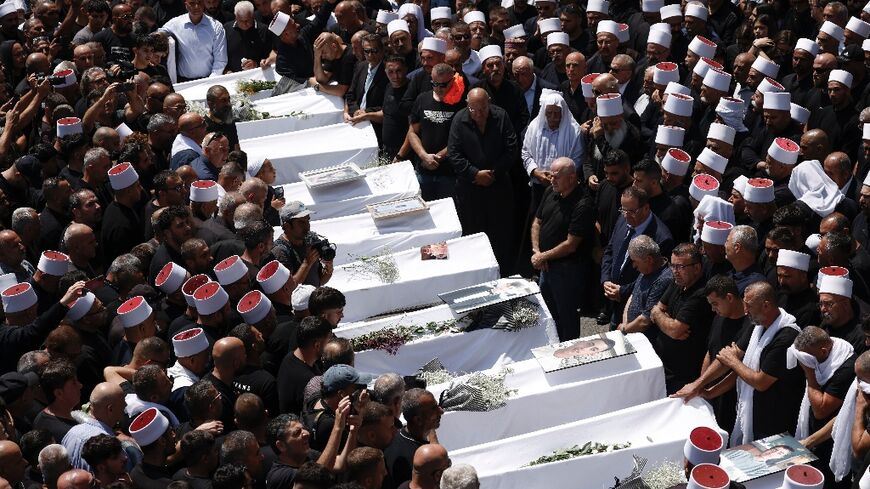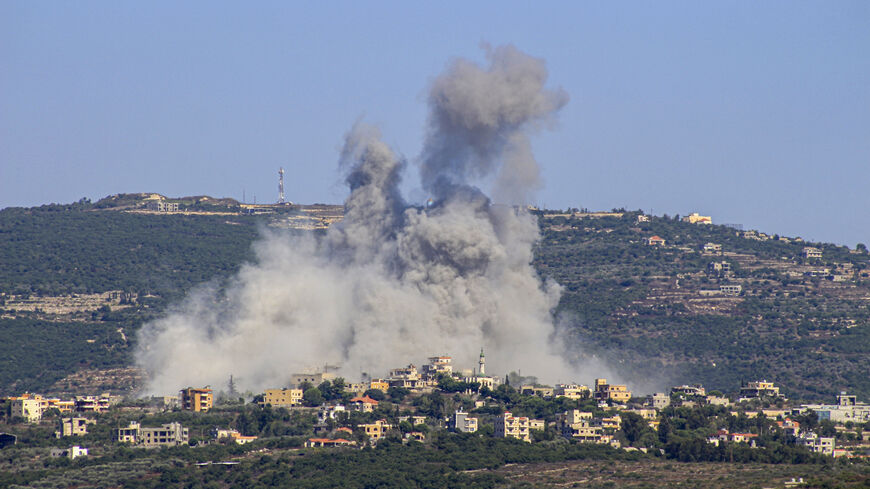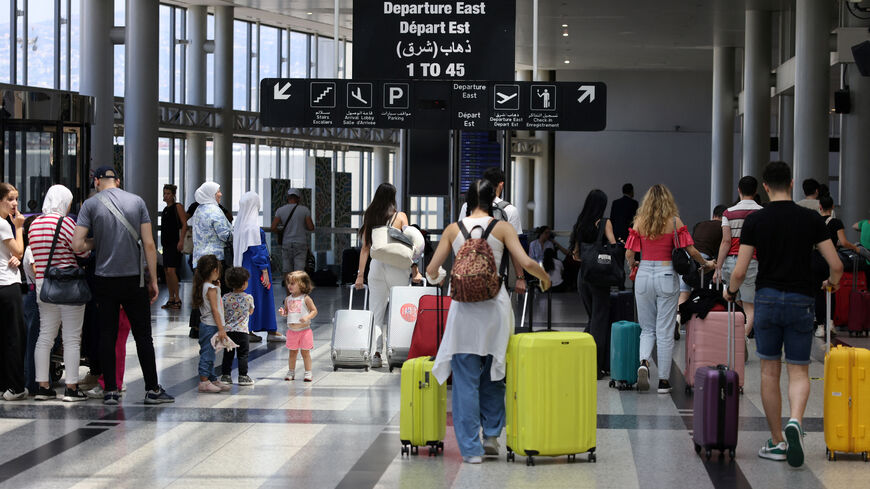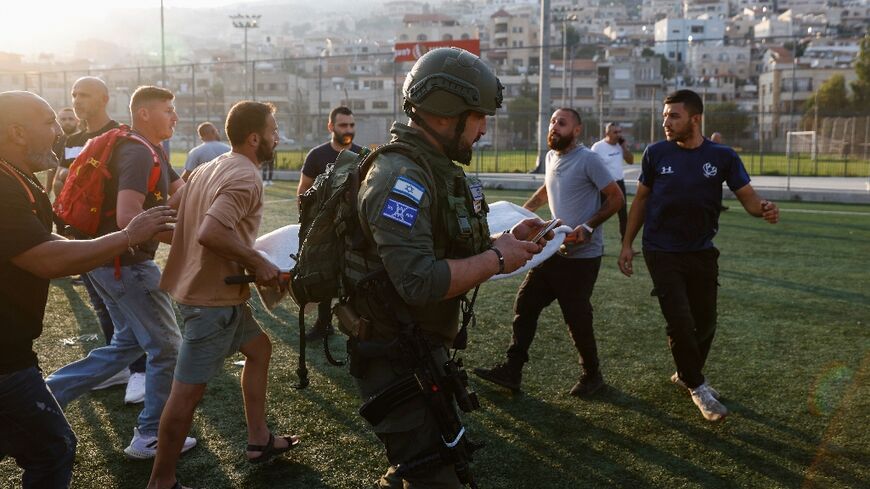Lebanon braces for Israeli response to Hezbollah as US urges restraint
A state of panic has spread across Lebanon, fearing a harsh blow from Israel after the Majdal Shams attack. Saudi Arabia, France, Norway and Sweden have urged their citizens to leave Lebanon as soon as possible and Hezbollah, bracing for an imminent attack by Israel, has already evacuated some key sites.
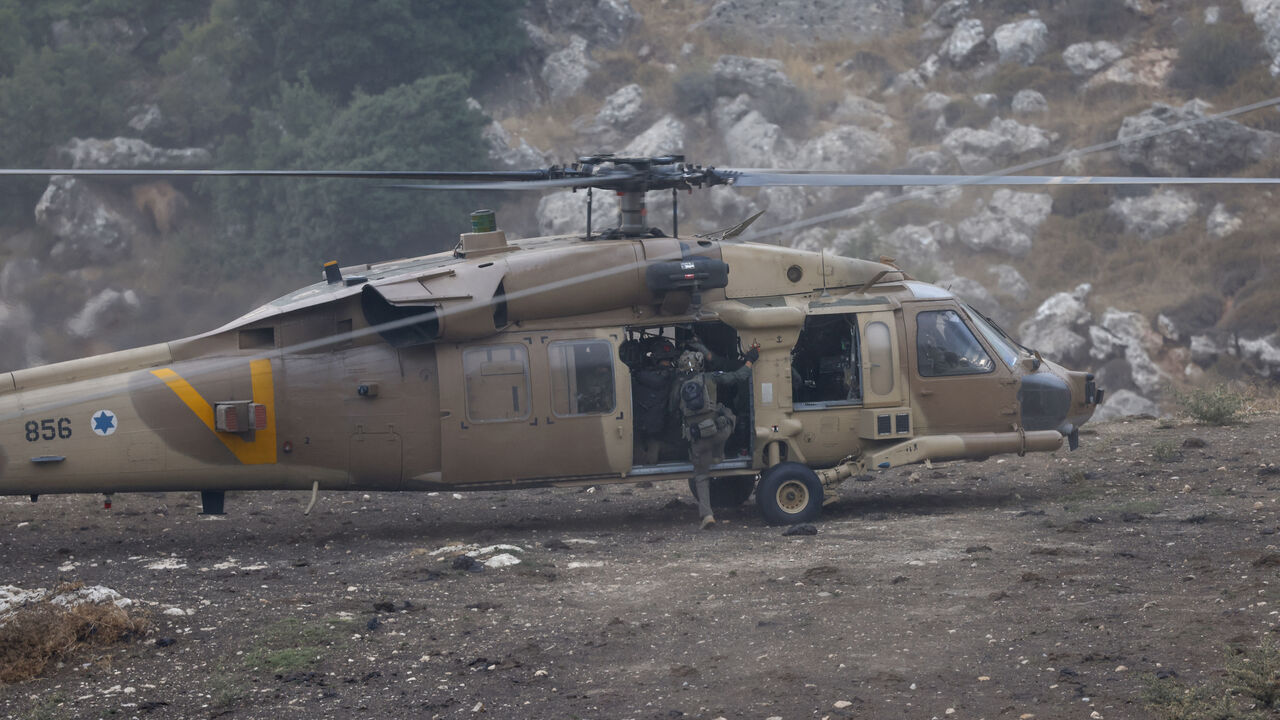
BEIRUT — Lebanon is on edge as it awaits an imminent Israeli response to Saturday’s rocket attack in the Israeli-annexed Golan Heights that killed at least 12 people, amid calls for restraint to avoid an all-out war in the country.
Israel accused Hezbollah of being behind the rocket attack that struck a soccer field in the Arabic-speaking Druze town of Majdal Shams in the Golan Heights on Saturday. At least 12 people were killed, most of them children, in the deadliest attack against civilians both in Lebanon and Israel since Hezbollah and the Israeli military began exchanging fire along the border on Oct. 8.
Israel occupied the Golan Heights following the 1967 war and annexed the territory in 1981.
Hezbollah issued a statement shortly after the attack “categorically” denying its involvement. Instead, it claimed a projectile from Israel's Iron Dome hit the town.
“The residents of Majdal Shams, which is a few kilometers away from Lebanon, know that their town falls within the circle of security and within the rules of war, and Hezbollah knows its special nature and the absence of military targets [inside the town] as well,” the statement added.
Meanwhile, a state of panic has spread across Lebanon, fearing a harsh blow from Israel. Saudi Arabia, France, Norway and Sweden have urged their citizens to leave Lebanon as soon as possible, according to several reports.
Two security sources told Reuters on Sunday that Hezbollah is bracing for an attack by Israel and has already evacuated some key sites in the south and the eastern Bekaa Valley.
On Sunday pro-Iranian groups and Hezbollah forces evacuated known positions in Damascus and the surrounding areas in anticipation of potential Israeli airstrikes, according to the Syrian Observatory for Human Rights.
The observatory reported that pro-Iranian groups withdrew from their posts in the Sayyida Zaynab area south of Damascus and areas southwest of Damascus and the southern province of Quneitra.
As fears of a full-blown war grow, several Lebanese officials and international actors have come out to call for calm and avoiding an escalation.
In a statement on Saturday, the Lebanese government condemned all forms of attacks against civilians, calling for an immediate cease-fire on all fronts.
Foreign Minister Abdallah Bou Habib told Reuters on Sunday that his government has asked the United States to urge restraint from Israel. According to Bou Habib, Washington in turn asked that Hezbollah show restraint as well.
Iran, which is Hezbollah’s main backer, warned Israel against any “new adventure” in Lebanon under “the pretext” of the Majdal Shams attack.
In a statement on Sunday, Iranian Foreign Ministry spokesperson Nasser Kanaani called on the international community to support the stability and security of Lebanon as well as the region, in the face of Israel’s actions that may pave the way for the outbreak of a wider regional war.
Egypt cautioned against opening a new war front in Lebanon. In a statement on Sunday, the Egyptian Foreign Ministry expressed deep concerns that these developments could “lead to the region sliding into a comprehensive regional war.”
The ministry stressed the importance of preserving Lebanon’s stability and supporting its people and called on “the international community to intervene promptly to prevent further deterioration of the situation, which could have catastrophic consequences for the entire region and undermine global peace and security.”
The United Nations also condemned the targeting of civilians, calling for their protection at all times.
“We urge the parties to exercise maximum restraint and to put a stop to the ongoing intensified exchanges of fire. It could ignite a wider conflagration that would engulf the entire region in a catastrophe beyond belief,” UN Special Coordinator for Lebanon Jeanine Hennis-Plasschaert and UNIFIL Head of Mission and Force Commander Aroldo Lazaro said in a joint statement on Saturday.
Israel security meeting underway
In Israel, Prime Minister Benjamin Netanyahu convened a meeting of his security cabinet on Sunday evening to discuss possible Israeli responses to the attack. Returning from his week-long visit to the United States on Sunday afternoon, hours earlier than originally planned, Netanyahu first consulted with the heads of the different security branches, including Defense Minister Yoav Gallant, before meeting with members of the security cabinet.
Ahead of the meeting, the Israeli air force struck targets it described as Hezbollah military infrastructure inside southern Lebanon.
Meanwhile, in the Golan Heights, thousands attended the funerals of the 12 children on Sunday. Gallant and Israeli military chief Herzi Halevi both went to Majdal Shams on Sunday morning to meet with the families of the victims and with the leaders of the village and the Druze community.
In a Sunday post on X, Netanyahu said that he spoke with the spiritual leader of the Druze community in Israel, Sheikh Mowafaq Tarif, “and expressed my profound sense of shock at the murder of the innocent children and people by Hezbollah.” Netanyahu added, “The entire nation of Israel sends its heartfelt condolences to the families of the murdered and to the entire Druze community. ... Hezbollah will pay a heavy price for this that it has not paid so far.”
Earlier in the day, Gallant wrote, “We will ensure Hezbollah, the proxy of Iran, pays a price for this loss.” Meeting with the Israeli military’s northern command, the defense minister instructed the army to prepare for every possible scenario.
US blames Hezbollah, works for restraint
The Biden administration is closely following the escalation and is working its diplomatic channels to urge restraint, Adam Lucente reports. US Secretary of State Antony Blinken said Sunday that the United States believes Hezbollah was responsible for the strike in Majdal Shams and voiced support for Israel’s right to respond.
“Every indication is that indeed the rocket was from Hezbollah. We stand by Israel's right to defend its citizens from terrorist attacks,” he told reporters in Japan, according to Agence France-Presse.
Blinken added that the United States is seeking an end to the Gaza war, saying the conflict has “gone on for far too long” and that Washington wants Israelis, Palestinians and Lebanese to “live free from the threat of conflict and violence.”
Washington is in discussions with Israel and does not want the conflict to escalate, Blinken said.
“We're in conversations with the government of Israel. And again, I emphasize its right to defend its citizens and our determination to make sure that they're able to do that,” he told reporters. “But we also don't want to see the conflict escalating. We don't want to see a spread. ... The best way to do that in a sustained way is to get the cease-fire in Gaza.”
The escalation comes as Mossad chief David Barnea, CIA chief William Burns, Qatari Prime Minister Mohammed al-Thani and head of Egyptian intelligence Abbas Kamel are meeting Sunday in Rome to continue talks on a potential deal between Israel and Hamas that would see the release of the hostages and a cease-fire in Gaza.
The United States has been working in parallel to reduce tensions on the Israel-Hezbollah border in recent weeks. Senior adviser Amos Hochstein called senior Lebanese officials on Saturday, urging restraint and swift condemnation of the attack.



